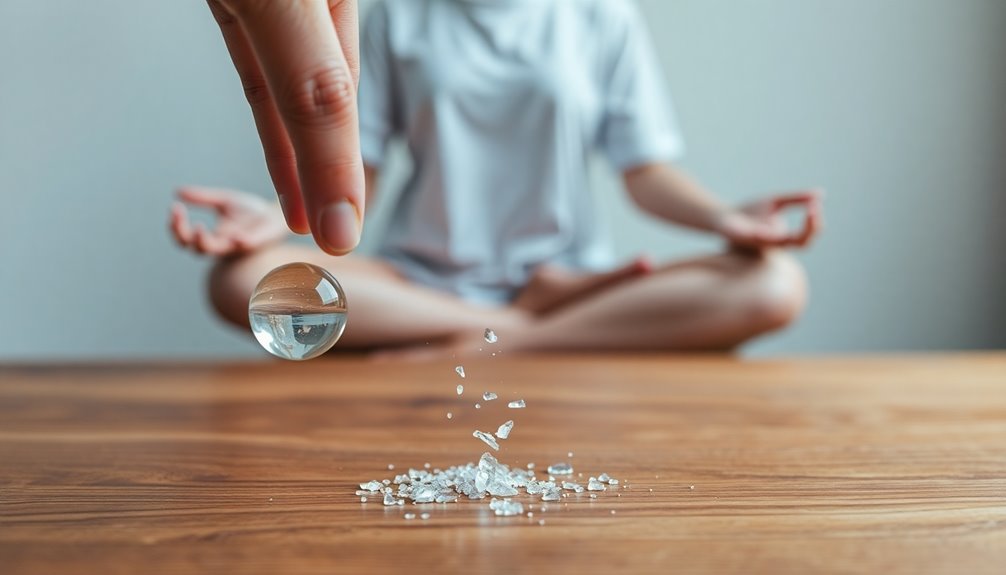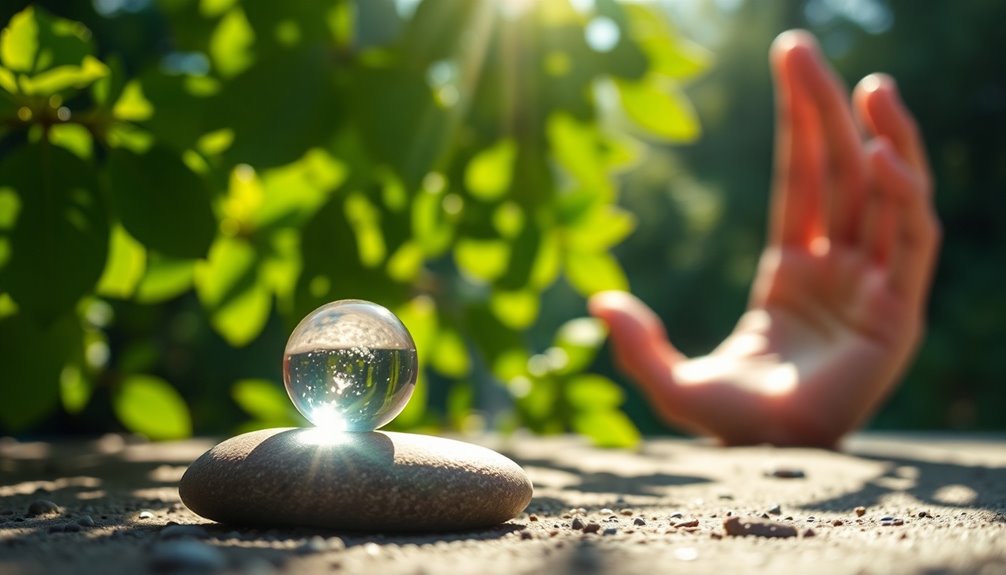If you keep dropping things, it might signal a need for personal transformation. This repeated action often reflects emotional or spiritual shifts, urging you to reassess your priorities and core values. You may be holding onto emotional baggage that needs release. Mindfulness and grounding practices can help you stay present and connected, offering clarity during these transitions. Embracing the chaos of change can lead to profound growth and self-discovery. By tuning into these hidden lessons, you can create space for more meaningful experiences in your life. There's so much more to uncover about this fascinating journey ahead!
Key Takeaways
- Dropping items may symbolize a need for personal transformation and a shift in identity or life direction, prompting self-reflection.
- It can serve as a reminder to reassess priorities and align actions with core values, leading to a more meaningful existence.
- Frequent drop incidents might indicate the release of emotional baggage, encouraging healing and forgiveness to make space for new experiences.
- Engaging in mindfulness and grounding practices can enhance awareness and support emotional stability during transitions, fostering personal growth.
- These incidents can highlight the importance of being present, urging individuals to connect with their surroundings and embrace the present moment.
Awareness and Mindfulness

Mindful awareness is a powerful tool that allows you to fully engage with the present moment. By noticing what's happening around you on purpose and without judgment, you cultivate a deeper understanding of your thoughts and feelings. Instead of getting caught up in your emotions, you can emphasize the now and what truly matters, enhancing the quality of your life.
This practice promotes mental stability and calmness, helping you focus better and boosting your productivity. You'll find that emotional distress, anxiety, and stress diminish as you immerse yourself in mindfulness. Additionally, it strengthens the immune system by reducing stress levels, which contributes to overall health.
Regular engagement with mindful practices can lead to improved sleep and overall well-being, while also strengthening your immune system and reducing the risk of stress-related illnesses.
Awareness in your daily life drives insights into your thoughts and emotions. As you become more aware, you'll notice non-beneficial tendencies and reactions that you can uproot.
This increased awareness fosters flexibility, understanding, and compassion, leading to more realistic expectations of yourself and others. By embracing mindful awareness, you not only enhance your life but also nurture your spiritual growth, establishing a clearer, more peaceful existence.
Need for Change

Have you ever noticed how often you drop things, and wondered if it's more than just clumsiness? This recurring act might signal a deeper need for change in your life. It often reflects a separation from the old, indicating that your current identity is shifting.
Whether it's a job loss, a breakup, or simply a feeling of stagnation, these disruptions can shatter your familiar frameworks, urging you to embrace transformation. As you experience this shift, remember that transformation invites wisdom and compassion for yourself and others. Relationships, especially with those who exhibit narcissistic behavior, may complicate your journey toward change. In this context, the principles of Law of Attraction can help you focus on positive outcomes and align your thoughts with your desires. Individuals with Borderline Personality Disorder may struggle with emotional instability during these changes, further complicating their relationships. High spiritual energy can enhance your ability to navigate these transitions more smoothly, providing you with increased intuition and clarity. Regularly engaging in mindfulness practices can help ground you during this transformative period.
You might feel fear in this phase, but consider it a necessary step toward growth. When you drop items, it may also suggest your decisions aren't aligning with your core values.
Take a moment to reflect—are you truly following a path that resonates with who you are? This reflection can help you identify guilt or discomfort with your recent choices.
Moreover, dropping things can signify a need to surrender control. Life's unpredictability can be daunting, but letting go allows for spiritual growth. Engaging in regular meditation practices can foster the inner peace needed to navigate this process.
As you navigate this journey, focus on shifting your motivations from security to humility. Embrace the chaos, trust the process, and prepare for a new way of living that aligns with your higher ideals.
Release of Emotional Baggage

Releasing emotional baggage can feel like a daunting task, but it's essential for your personal growth and well-being.
Emotional baggage consists of unresolved hurts, fears, and negative emotions from your past that shape your behaviors and attitudes. These feelings can create a subconscious blueprint, affecting how you interact with others and navigate relationships. Carrying this weight may also lead to physical issues like anxiety and chronic pain. Research shows that emotional baggage can lead to chronic stress and impaired decision-making, making it crucial to address these issues for overall health. Learning to set boundaries can also help you manage the impact of emotional baggage on your life. Additionally, unresolved emotional issues can contribute to chronic pain, making it vital to address them holistically.
Forgiveness plays a crucial role in letting go. It won't change the past, but it will free you from the burden of old wounds. Think of holding onto anger like keeping rotten milk; it only harms you. By practicing forgiveness, you open your heart to new experiences and joy.
Being present and mindful helps you release emotional baggage. Focus on the here and now, avoiding the grip of past memories. When you drop things, consider it a spiritual sign to slow down and be intentional. Developing a structured routine can further support your efforts to remain grounded during this process.
Engage in mindfulness practices like meditation and deep breathing to enhance this process. Acknowledge and release the weight of your past, knowing that healing takes courage and time, but it significantly alters your future.
Reassessing Priorities

Dropping things can serve as a wake-up call, urging you to slow down and reevaluate what truly matters in your life. This moment can highlight the need for self-reflection, allowing you to rediscover your core values and priorities. Ask yourself if your current focus aligns with your deeper dreams and goals. It's essential to identify where your energy is scattered and what truly deserves your attention. Engaging in visualization techniques can help clarify your intentions and keep you aligned with your true desires.
Your priorities should be driven by your values, shaping your actions and decisions. Take time to understand what you genuinely value and ensure those aspects are present in your daily life. Aligning your priorities with your core beliefs will make your activities more meaningful and fulfilling. Additionally, incorporating regular self-assessment tools can help you identify your personal needs more effectively. Recognizing the importance of mindfulness techniques can also enhance your ability to focus on what matters. Understanding your priorities can also support your personal growth and development, such as through parenting resources.
Life often fills every available space, making it crucial to prioritize wisely. Balancing work, relationships, and personal growth is key to nurturing connections and pursuing your dreams.
Overcommitting can leave you feeling overwhelmed, causing you to lose sight of what matters most. By reassessing your priorities, you create a more centered, fulfilling existence, allowing you to cherish life's small moments without unnecessary distractions.
Energy and Grounding

Grounding plays a crucial role in maintaining your energy balance and overall well-being. It connects your physical and soul energies, allowing for a harmonious flow within your body. When you ground yourself, you discharge unwanted energies and restore your energy field, promoting an immediate sense of calm. This practice enhances your mental, emotional, and empathic clarity, helping you stay centered. To ground yourself, draw awareness to the earth beneath you. Feel its support and visualize your energy sinking into it.
Try walking barefoot to deepen this connection, or nourish your body with heavy, sustaining foods like root vegetables. Incorporating somatic mindfulness can also anchor you in the present moment. Regular grounding practices can lead to significant changes in perception and energy levels, ultimately enhancing your overall well-being and increasing your vitality.
Grounding not only connects your higher and lower chakras but also enhances your spiritual awareness. It allows you to feel more supported and connected to others, especially during challenging times.
Frequently Asked Questions
Can Dropping Things Indicate a Spiritual Awakening?
Dropping things can indeed indicate a spiritual awakening.
It often signals a need for you to slow down and become more mindful of your surroundings. This act might represent the release of old habits or emotions that no longer serve you.
As you navigate this awakening, it encourages reflection on your current path and decisions, guiding you toward growth and transformation.
Embrace these moments as opportunities for greater awareness and connection to your inner self.
What Should I Do After I Drop Something?
When you drop something, take a moment to pause.
Recognize your emotional state and any stress you might be feeling. Reflect on the surroundings—were you distracted?
Afterward, consider what the dropped item means to you. Is it a sign to slow down or reassess priorities?
Use this moment to practice mindfulness, grounding yourself in the present.
Journaling about these incidents can help you uncover patterns and promote greater awareness moving forward.
Are There Specific Items With Unique Meanings When Dropped?
Yes, specific items do carry unique meanings when dropped.
For instance, dropping your phone might signal a need to disconnect from technology and reconnect with real-life experiences.
If you drop something fragile like an egg, it can remind you to handle life's opportunities with care.
In general, dropping items often suggests a need for change, emotional release, or a call to find balance in your life.
Pay attention to what you drop!
How Can I Prevent Dropping Things in the Future?
To prevent dropping things in the future, focus on improving your coordination and mindfulness.
Engage in activities that enhance your hand-eye coordination, and practice mindfulness techniques to keep your attention on the task at hand.
Ensure you're getting enough sleep and managing stress effectively.
Slow down your movements, and take a moment to breathe before reaching for objects.
Regular physical exercise can also help improve your balance and stability.
Is There a Connection Between Dropping Things and Physical Health?
Yes, there's definitely a connection between dropping things and physical health.
You might experience coordination issues due to neurological conditions or hand and wrist problems, affecting your grip strength.
Fatigue and sleep deprivation can also make you clumsier.
These factors not only increase your risk of injury but can also impact your overall quality of life.
If you notice frequent dropping, it's wise to consult a healthcare professional for evaluation.
Conclusion
In dropping things, you're not just being clumsy; it's a powerful message from the universe. It nudges you to be more aware and mindful of your surroundings, urging change and growth. Embrace this as an opportunity to release emotional baggage and reassess your priorities. By grounding your energy, you'll find balance and clarity. So, next time you drop something, pause and reflect—it might just lead you to a deeper understanding of yourself and your path ahead.










